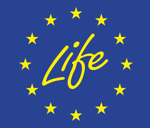
The continuous increase of salinity in groundwater and surface water in semi-arid countries of the Mediterranean basin, such as Spain, has a clear effect on the quality of treated urban wastewater. Due to their salinity, they cannot be discharged into surface water bodies as this would affect natural ecosystems. This problem of increased salinity is sometimes compounded by an excess of nitrogen and phosphorus units which, if discharged into other sensitive bodies of water, can produce an undesirable effect such as eutrophication.
The Conquer project makes a proposal to convert salinity into solutions that can have different uses as well as to reconvert those fertilizer units contained in the wastewater into special fertilizers for agriculture. These conversions of salinity and fertilizer units are intended to be carried out as follows:
In this way, we would be able to overcome two major disadvantages of treated urban wastewater to be able to reuse it sustainably. Being able to produce this type of by-products from our treated urban wastewater is associated with the integration of separation and concentration technologies such as nanofiltration or ion exchange membranes, which make it possible to separate or fractionate those ions that have nutritional and fertilizing properties from those that are necessary to produce hypochlorite. In a second stage, the integration of electrodialysis (ED) technology with selective membranes to monovalent cation exchange membranes (CEM) and anion exchange membranes (AEM), will allow to increase the concentration of these flows to enable their application on an industrial scale.
One of the most important scientific and technological challenges are the processes of fractionation or separation of ions according to their functional properties in the process, either as nutrients and fertilizers or as biocides. AQUATEC and Cetaqua, in the framework of the Conquer project, will evaluate at pilot plant level a new generation of nanofiltration membranes where through processes of modification of the properties of the active layer (acid-base properties) it is intended to quantify the separation factors of these ions.
The project will also integrate:
These tools associated with the concepts of water or industry 4.0 allow optimizing the operation based on the control of water recovery factors, salinity elimination and will also allow reducing membrane fouling. This stage is being developed and validated at laboratory scale in a collaboration of the “Resource Recovery and Environmental Management” (R2EM) group of the Universitat Politècnica de Catalunya and Cetaqua. In the second stage, through the integration of membrane electrochemical (ED) technologies, it will be possible to concentrate the flows obtained from nanofiltration to obtain hypochlorite using electrochemical technologies, which is being developed by Aquatec and Cetaqua.
Therefore and globally, the proposed solution, in addition to enabling the transformation of the salinity of treated wastewater into by-products in the fields of water treatment and agriculture, represents an approach of circularity of materials as proposed in the principles of the circular economy that AQUATEC is promoting at the national level.